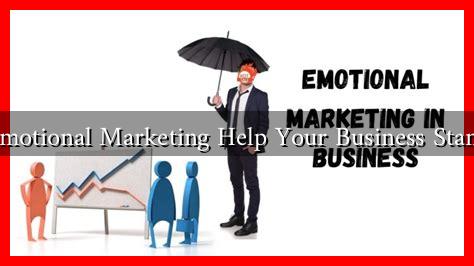-
Table of Contents
Can Emotional Marketing Help Your Business Stand Out?
In today’s competitive marketplace, businesses are constantly seeking innovative ways to differentiate themselves from the competition. One powerful strategy that has gained traction in recent years is emotional marketing. This approach taps into the feelings and emotions of consumers, creating a deeper connection between the brand and its audience. But can emotional marketing truly help your business stand out? Let’s explore this concept in detail.
Understanding Emotional Marketing
Emotional marketing is a strategy that aims to evoke specific feelings in consumers to influence their purchasing decisions. By appealing to emotions such as happiness, nostalgia, fear, or even anger, brands can create memorable experiences that resonate with their audience. This approach is grounded in the understanding that consumers often make decisions based on feelings rather than logic.
The Science Behind Emotional Marketing
Research has shown that emotional responses can significantly impact consumer behavior. According to a study by the American Marketing Association, emotionally charged advertisements are more likely to be remembered and shared. Here are some key statistics that highlight the effectiveness of emotional marketing:
- Ads that evoke strong emotions can increase sales by up to 23%.
- Emotionally connected customers are 52% more valuable than those who are just satisfied.
- Brands that engage with customers on an emotional level enjoy a 33% increase in customer loyalty.
How Emotional Marketing Can Help Your Business Stand Out
Emotional marketing can set your business apart in several ways:
- Building Stronger Connections: By tapping into the emotions of your audience, you can create a bond that goes beyond the transactional relationship. This connection fosters loyalty and encourages repeat business.
- Enhancing Brand Recall: Emotional ads are more memorable. When consumers associate your brand with a specific emotion, they are more likely to remember it when making purchasing decisions.
- Encouraging Social Sharing: Content that evokes strong emotions is more likely to be shared on social media, increasing your brand’s visibility and reach.
- Creating a Unique Brand Identity: Emotional marketing allows you to express your brand’s values and personality, helping you stand out in a crowded market.
Successful Examples of Emotional Marketing
Many brands have successfully leveraged emotional marketing to enhance their visibility and connect with consumers. Here are a few notable examples:
- Always – #LikeAGirl: This campaign challenged gender stereotypes and empowered young girls, resonating deeply with audiences and sparking conversations about gender equality.
- Coca-Cola – Share a Coke: By personalizing their product with names, Coca-Cola created a sense of connection and nostalgia, encouraging consumers to share their experiences on social media.
- Google – Year in Search: Google’s annual video showcases the most searched moments of the year, often highlighting emotional stories that resonate with viewers, reinforcing the brand’s role in people’s lives.
Implementing Emotional Marketing in Your Strategy
To effectively incorporate emotional marketing into your business strategy, consider the following steps:
- Identify Your Audience: Understand the emotions that resonate with your target demographic. Conduct surveys or focus groups to gather insights.
- Craft Your Message: Develop a narrative that evokes the desired emotional response. Use storytelling techniques to create relatable and engaging content.
- Choose the Right Channels: Select platforms that align with your audience’s preferences. Social media, video content, and email marketing can be effective channels for emotional messaging.
- Measure Your Impact: Track engagement metrics, sales data, and customer feedback to assess the effectiveness of your emotional marketing efforts.
Conclusion
Emotional marketing is a powerful tool that can help your business stand out in a crowded marketplace. By connecting with consumers on an emotional level, you can foster loyalty, enhance brand recall, and encourage social sharing. As demonstrated by successful campaigns from brands like Always and Coca-Cola, tapping into emotions can create lasting impressions and drive sales. As you consider your marketing strategy, remember that the heart of effective marketing lies in understanding and appealing to the emotions of your audience.


